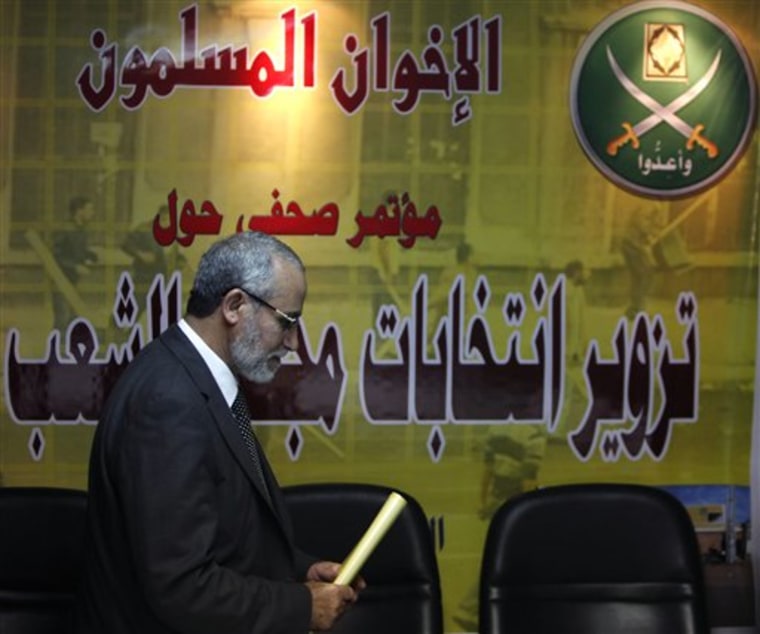Egypt's top two opposition movements on Wednesday pulled out of parliamentary elections after they were all but shut out in a first round of voting, in a surprise response to widespread allegations of fraud.
The move by the fundamentalist Muslim Brotherhood — the country's strongest opposition force — and the smaller, secular liberal Wafd party is a blow to this top U.S. ally's efforts to portray itself as a democracy. Egypt's government has staunchly defended the fairness of last Sunday's election, despite reports by independent rights groups of blatant rigging in favor of the ruling party.
The result will likely be a 518-seat parliament almost entirely made up of the ruling National Democratic Party, with a few seats going to independents and smaller parties.
"The headline of the Sunday elections is how the NDP brought down the outlawed group. This is the most important result of this first round of the elections," said Ahmed Ezz, a senior ruling party official.
The boycott was an unprecedented step by Egypt's opposition, which has for decades participated in elections that were consistently rigged, eager for the few seats they took each time. The move suggested deepening frustration with the domination of power by President Hosni Mubarak's ruling power despite promises of reform.
"The ruling party is declaring itself as the only party in the country," said Abdullah al-Sinawi, an analyst and editor of the opposition Al-Arabi newspaper. "There is now a widespread sentiment that there is no use in trying to get this regime to reform."
The government was widely seen as determined to purge the Brotherhood from the legislature — particularly ahead of presidential elections next year. There are questions over the future of the country's leadership, after 82-year-old President Hosni Mubarak underwent surgery earlier this year to remove his gallbladder.
The Brotherhood, which is banned but runs candidates as independents, came under a heavy crackdown ahead of the vote, with some 1,400 of its activists arrested during the campaign.
The Brotherhood held 88 seats in the outgoing parliament — a fifth of all seats. But results announced Tuesday showed not a single candidate from its ranks won a seat in the first round. Fewer than 30 Brotherhood candidates made it to the run-offs.
Those will pull out and the Brotherhood will boycott the second round, the movement announced Wednesday.
"What happened has shown that the regime is a usurper of power and a forger of the will of the nation and is continuing on the path of corruption and tyranny. By not participating in the run-off round we are declaring our protest," the Brotherhood said in a statement posted on its website.
'Fraud and thuggery'
The Wafd party, which had six seats in the outgoing parliament, also announced its withdrawal because of "fraud and thuggery" during the first round.
"This is a message to those rigging elections," its spokesman Moataz Salah Eddin said. Two Wafd candidates who won in the first round will take their seats as independents, he said.
NDP Secretary-General Safwat el-Sherif said the Wafd's decision is not final, and dismissed the Brotherhood's withdrawal as sour grapes, saying it "does not affect the legitimacy of the elections."
"They might not want to continue in a competition that's not in their favor because society has spoken now," he told a news conference.
Ezz, who organized the NDP election campaign, said the groups were trying "to steal our success," but said the election had shown "the true extent of their grassroots power."
The only other such opposition boycott was in 1990, prompted by the government's support of the U.S. in the Gulf War.
The Wafd is the oldest and most effective of Egypt's secular opposition parties — though that's not saying much. The parties are largely shells with almost no grassroots organization or support. They win no more than a handful of seats in any election.
Only the Brotherhood is well organized around the nation, drawing popularity in part from the social services it provides. Its capture of so many seats in the 2005 vote stunned the government, prompting successive crackdowns that arrested thousands of its members.
Official results announced Tuesday gave the ruling NDP 209 of the 508 seats up for grabs in the election. Another 10 seats will be appointed by the president. Non-Brotherhood independents took seven seats and recognized parties other than the Wafd won three.
The run-off will determine the remaining seats. More than 100 seats in the runoffs will be contested between two ruling party candidates, ensuring that many seats will also go to the NDP.
There had been considerable internal debate within the Brotherhood whether to participate in the election. Also, Nobel peace laureate Mohammed ElBaradei — who has emerged as a symbol for the reform movement — had called for a boycott, arguing that participating would only legitimize a vote widely expected to be rigged.
The ruling party's goal seemed to be to ensure that the Brotherhood could not use parliament as a platform for dissent amid the uncertainty over the country's future.
Mubarak is believed to be grooming his son Gamal to succeed him. But there is widespread public opposition to the "inheritance," and Mubarak could still decide to run again in next year's election.
